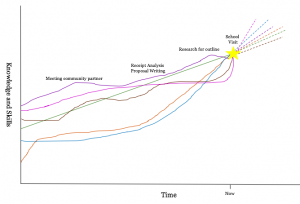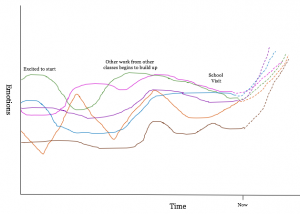“I feel like every project I work on is a dream project, so long as I am learning.” – Simeon Kondev
As Simeon explains, the most important part of a project is what you learn. This week gave our group the opportunity to reflect on our project so far. We thought about all the ups and downs emotionally that we’ve experienced this semester as well as the knowledge that we’ve gained throughout this project. We hope you’ve enjoyed the journey so far as much as we have and look forward to how this adventure ends!
Weekly Objectives and Achievements
Week 5 (October 17th to 21st)
Objectives:
- Prepare for the school visits to Alderson Elementary on October 24th and 25th and organize rides with the group member who is responsible for driving
- Start entering the data for the school receipts into the spreadsheet based on the template provided by Robin
- Start conducting research on the communities of the schools we have received receipts for. Research the local food assets, and food security for each target community.
- Organize a second meeting with our community partner by contacting Robin
Achievements:
- In order to prepare for the school visits each group organized a time and place to meet with the group member driving in order to get to Alderson Elementary school at 7:45 am.
- Started conducting research for each target community in order to meet the deadline of October 24th
- Group members started entering data on the school receipts into spreadsheets based on the template provided by Robin in order to meet the deadline of October 24th.
- Contacted and organized a meeting with Robin. The group visiting Alderson Elementary on October 24th will meet with Robin after the breakfast program is over.
Week 6 (October 24th to 28th)
Objectives:
- Visit a school in Coquitlam that is part of the Breakfast Program run by the Breakfast Club of Canada.
- Finish all receipt logs by the 24th.
- Meet with Robin Ryan for an update on current progress so far as well as future progress.
Achievements:
- Our group all managed to see the Breakfast Program in action at Alderson Elementary in Coquitlam on two different days. On October 24th, Kate, Chloe and Claire went to see and help out with the program. The rest of the group, Mercy, Angela and Nika went the following day.
- Kate, Chloe and Claire met with Robin following the school visit to report on current progress so far and establish a timeline for the remaining weeks of the semester.
- All receipts were analyzed and the school financial spending patterns were completed and looked over by Robin.
Week 7 (October 31st to November 4th)
Objective:
- Start working on Blog post number 3
- Analyze schools assigned to each group member on a google doc spreadsheet before November 4th including location of school, food assets near school, financial tables of proportion of expenditure on different food categories, and challenges faced by schools
- Contact food distributors that can be potential partners with Breakfast Club of Canada, and details need to be include (eg. products they supply, service area, whether they open to serving school, chance for discounts and minimum order size). Each group member is supposed to contact at least two food distributors, and integrate individual part into one Google doc profile before November 4th.
Achievements:
- Finished the third group blog post on November 5th
- Posted individual part for food financial breakdown and information collected from contacting food distributors on Google doc. Invited Robin to Google doc and received feedback from him.
- Identified and discussed moments of significant change that have occurred in our project and created infographics during tutorial session.
Our Eureka Moment (aka Moment of Significance)


You can see from our graphs that we have all had unique experiences over the course of our community project. Gaging our skills and knowledge there was a common pattern of increased growth, although happening at different rates. We also all foresee gaining more knowledge through the completion of the remainder of the project.
Our graph that charted our emotional experience shows a significant contrast between group members. Some members have had fairly steady emotions through the semester, whereas others have had more severe peaks and dips in their emotional well-being.
The most noteworthy part of our graphs, a commonality between all group members and both graphs, is the moment of significance where every group member charted their best emotional experience and period of highest earned knowledge. This moment signified when we had the opportunity to visit Alderson Elementary School in Coquitlam, where we were able to observe and participate in the daily breakfast program. Our group separated into two groups of three and visited the school on Monday, October 24th and Tuesday, October 25th. At the schools we helped prepare breakfast, had the opportunity to interact with staff and students, looked at the kind of foods that were being served, and took note of the community response to the program. Half of the group had the opportunity to reconnect with our community contact, Robin Ryan, which allowed for us to realign on the goals and deadlines we established at the beginning of the term. This allowed us to walk away with more clarity and confidence in what we have to accomplish for the rest of the semester.
In addition, being able to participate in the breakfast program, allowed us to build a more genuine connection and investment in our community project. As Ron Finley said “If kids grow kale, kids eat kale. If they are not exposed to this, they blindly eat whatever you put in front of them” (2013). This likens to our experience volunteering in the breakfast club. Not being exposed to a breakfast program, we are doomed to believe whatever we hear and read as we would not have the context to form our own judgements and opinions. And as the kids and their kale, experiencing the program allowed us to become personally involved, resulting in a our group finding new personal meaning to carry us through the rest of the project.
In our group meeting with Robin we broke down how the program was run at Alderson elementary, and for that matter many of the schools that our group is analyzing for our final report. We had a discussion about the patterns of foods being purchased: the good, the bad, the popular, the expensive. For example, syrup was a common food commodity purchased by many schools, one of no nutritional value, and loaded with sugar. Brainstorming how we could minimize the purchase of syrup is difficult because of the different stakeholders who contribute to that decision. This decision parallels with the conflicts in the Metro-Vancouver food system discussed in the article “Parallel alternatives: Chinese-Canadian farmers and the Metro Vancouver local food movement”. The local food movement in Metro Vancouver, often excludes opinions of the Chinese-Canadian farmers, which leads to skewed decisions, as Chinese-Canadians make up 15% of the Metro Vancouver farming population (Gibb & Wittman, 2012). This paradigm resembles a school food system through the relationships of authority figures and staff with students. Although we want to ensure kids are receiving densely nutritious food, they still need to be foods that appeal to kids. Not considering a child’s opinion of what they want to eat for breakfast can lead to breakdowns in the program, as unrealistic purchases are then made. This leads to inefficient spending as food is wasted, which is the exact problem our group is trying to solve in the Northern BC food system. Through the lecture discussions and readings, our group has new perspectives to integrate into the remaining aspects of the assignment, which will hopefully allow us to make recommendations that consider all those involved in the school system and reach decisions that benefit all groups.
Our Graceful Dismount:
Although our group has worked well together and our project has gone smoothly so far, we recognize the possibility of setbacks as we approach the final stages of our data collection and analysis. There are a number of ways we can act in order to ensure we dismount from our collaboration with the Breakfast Club in an elegant and graceful manner. Most importantly, we plan to think ahead and maintain our communication.
We set out our goals and target dates for their completion in our project proposal, and thus far have kept to them diligently, but to ensure success we have re-examined and updated our timeline, as seen below in table 1.
The ‘moments of significance’ activity was instrumental in helping us identify the various highs and lows that we have had in the course so far and got us to think about feedback . We intend to incorporate the feedback that we receive from our peers to improve the group’s efficiency and working dynamics going forward because we do recognize that feedback is an essential part of learning.
Another step we can take is inspired from the podcast ‘Failure is your Friend’ by Freakonomics, which explains the value in looking ahead to the end of a project and predicting failure. Although it is tempting to assume everything will go well, and leave it at that, there is a huge benefit to acknowledging all the ways a project can go wrong. If we take some time in our group to brainstorm some possible disastrous failures, we can come up with strategies to deal with setbacks and recognise problems before they have a chance to escalate.
Our community partner has been firm, yet very supportive. This has helped keep us on top of our assignments, from not only completing tasks on time, but also doing them to a standard approved by the Breakfast Club of Canada. It is important to us that we maintain the good working relationship that we have built, and one way we intend to do this is by maintaining constant communication and updating him on our progress throughout the remainder of the project.
Additionally, communication within our group has been an essential element of our success so far. Thanks especially to some of our more diligent group members, we correspond regularly to touch base, delegate our tasks, and clarify any unsurety. As we continue to work with our data and incorporate feedback from our community partner, constant and detailed communication between our members will help circumvent possible confusion within the group. This will keep our work at a high quality and ensure we are able to meet our deadlines with confidence.
Table 1: An updated timeline to guide our group’s journey to the fast-approaching end of our project
| Timeline | Target dates | |
| Project Steps: | Rough drafts of financial food breakdowns completed and and available to community partner | Nov 4 |
| Template of final report sent to community partner for feedback | Nov 7 | |
| Community partner provides feedback and suggestions for additional tasks | Nov 11 | |
| Brainstorm future directions for the project and creative development strategies for the target schools with guidance from our community partner | Nov 12-24 | |
| Project and final report completed | Nov 25 | |
Some Final Words:
All in all, the past few weeks have been very exciting for our group. From completing our receipt logs to seeing the breakfast programs in action, we could not be happier with how this project is going. We have now transitioned into the part of the project where we get to add our own insights and truly start to work towards helping these schools the best way we can. Stay tuned for our final farewell!
References:
Finley, R. (2013, March). A Guerilla Gardener in South Central LA. Speech presented at Ted Talk. Retrieved from https://www.ted.com/talks/ron_finley_a_guerilla_gardener_in_south_central_la?language=en
Gibb, N., & Wittman, H. (2012, August 21). Parallel alternatives: Chinese-Canadian farmers and the Metro Vancouver local food movement. Local Environment, 18(1), 1-19. doi:10.1080/13549839.2012.714763
